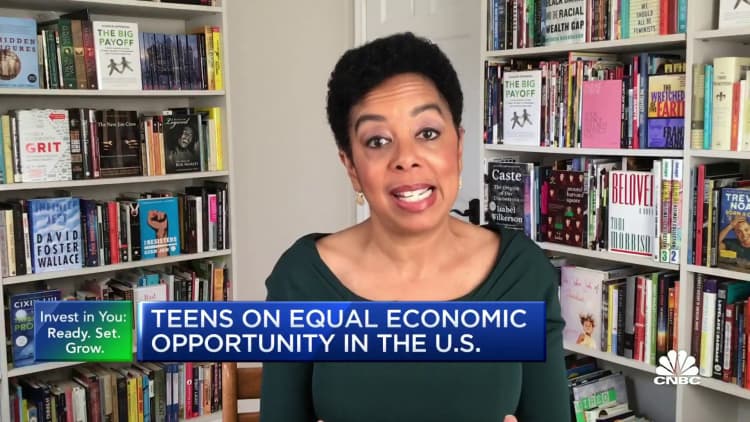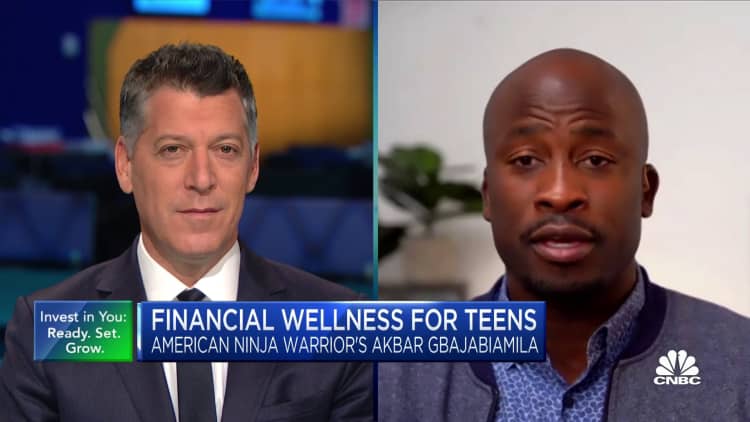Teens agree – the U.S. has a problem with equal economic opportunity.
More than 60% of teenagers said they believe people in the U.S. are paid less based on race, ethnicity and gender, according to the Junior Achievement Teens and Economic Opportunity Survey released Monday. The survey was conducted by Engine Insights online between Nov. 17 and 22 and asked 1,004 teens ages 13 to 17 about diversity, equity and inclusion.
In addition, 69% of teens surveyed believe people have a harder time getting financial support to start a business due to race, ethnicity and gender, and 73% believe that racism is embedded into societal institutions such as laws, rules and procedures.
The results come amid the coronavirus pandemic, which has exacerbated economic issues in the U.S. Covid-19 has disproportionately hit those least able to bear its burdens – especially low-wage workers, people of color and women. These impacts have not been lost on teenagers.
"The disparities are starting to show up more so than ever before in the lives of teenagers right now because of Covid and the impact it's having on people," said Yanely Espinal, director of education outreach at Next Gen Personal Finance.

The solutions teens see - and who they think is responsible
In some ways, the pandemic has been a silver lining in bringing awareness to economic issues, according to certified financial planner Rianka Dorsainvil, co-founder and co-CEO of 2050 Wealth Partners.
"It has forced us to stop living in our bubble and see what's happening in other people's communities and in our own communities," she said.
Beyond noticing inequality in society, teens have a lot of ideas about what can bridge the gaps, according to the survey – 45% said education was the best way to address the issue while 35% said changing laws, 30% said business reform and 23% suggested paying reparations to specific groups to make up for past injustices.
The survey also showed that teens think many institutions have a responsibility to help level the economic playing field including the government, local communities, businesses, schools and even those experiencing inequality themselves.
"This generation is going to hold us all accountable, so we have to get ready," said Dorsainvil.
More from Invest in You:
Covid financial stress hits Blacks, Hispanics disproportionately
Families are in survival mode. How it's changing their money mindset
How to navigate uncomfortable money matters with your family
What teens can do now
There are also some things that teens can do now to set themselves up for future success, according to Dorsainvil and Espinal.
One is to take financial education into their own hands through resources available either in their communities or online.
Teens can draw on the wisdom of adults around them by asking what they wish they knew about money or had done with their finances when they were younger, said Espinal. She also suggested that teens follow hashtags about money on social media to start learning about personal finance.
"That is going to help you become more financially conscious," she said.

Dorsainvil agreed, adding that teens seeking financial information online should check their sources for appropriate credentials, such as a CFP. She also said that one of the most important things teens can start early is learning to budget and manage their cash flow.
Teens interested in learning more about entrepreneurship can also seek mentors that can help guide them, said Dorsainvil, who is also a member of the CNBC Advisor Council.
"Any type of business involves capital, and while that may be a barrier for many of us to start a business, getting a mentor is something that is free and something that we should definitely leverage," said Dorsainvil, adding that there are many programs and grants out there to help teens and other young adults.
REGISTER NOW: Join CNBC and Junior Achievement on Tuesday, Dec. 8, 2020, at 1-2 pm ET to attend a virtual summit for a more equitable and just tomorrow. Register here.
Disclosure: NBCUniversal and Comcast Ventures are investors in Acorns.






